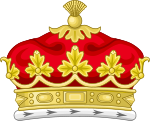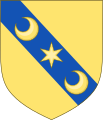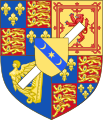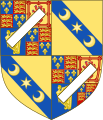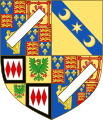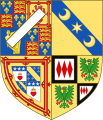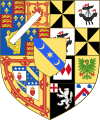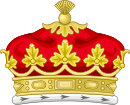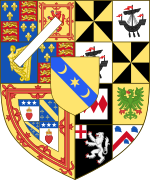Duke of Buccleuch facts for kids
The Duke of Buccleuch (pronounced "buh-KLOO") is a very old and important title in Scotland. It's a special kind of noble title, like being a prince or a count, but in Scotland it's called a 'peerage'. The title was first created a long time ago, in 1663.
Quick facts for kids Dukedom of Buccleuchheld with Dukedom of Queensberry |
|
|---|---|
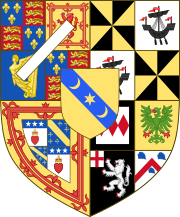 |
|
| Creation date | 1663 |
| Monarch | Charles II |
| Peerage | Peerage of Scotland |
| First holder | James Scott |
| Present holder | Richard Scott, 10th Duke |
| Heir apparent | Walter Scott, Earl of Dalkeith |
| Remainder to | the 1st Duke's heirs male of the body lawfully begotten |
| Subsidiary titles | Marquess of Dumfriesshire Earl of Buccleuch Earl of Dalkeith Earl of Doncaster Earl of Drumlanrig and Sanquhar Viscount of Nith, Tortholwald and Ross Baron Scott of Tindale Lord Scott of Buccleuch Lord Scott of Whitchester and Eskdaill Lord Douglas of Kilmount, Middlebie and Dornock |
| Seat(s) | Bowhill House Drumlanrig Castle Boughton House Eildon Hall (Scottish Borders) Dalkeith Palace* |
| Former seat(s) | Montagu House |
| Motto | Amo ("I love") |
| *Dalkeith Palace remains in the ownership of the Dukes, but is not presently inhabited by them or their family. | |
The first Duke of Buccleuch was James Scott, 1st Duke of Monmouth. He was the oldest son of King Charles II. But he lost his titles because he rebelled against his uncle, King James II.
Luckily, his wife, Anne Scott, also had the title in her own right. So, her title was not affected. It passed down to their children and their families. Over time, the family name has changed a few times.
In 1810, the 3rd Duke of Buccleuch also inherited another important title: the Duke of Queensberry. This means the same person holds both titles!
Contents
History of the Dukes
The family of the Dukes of Buccleuch, called the Scotts, became very important a long time ago. This was thanks to a man named Sir Walter Scott. He received a lot of land in Scotland from King James II in 1452.
The family's history goes back even further, to a Sir Richard le Scott who lived in the 1200s. Another famous ancestor was Sir Walter Scott of Branxholme and Buccleuch. He was known for his bravery in a battle in 1547. His great-grandson, Sir Walter, was given the title Lord Scott of Buccleuch in 1606.
Other Important Titles
The Duke of Buccleuch holds many other titles too! These include:
- Earl of Buccleuch (created in 1619)
- Earl of Dalkeith (created in 1663)
- Lord Scott of Whitchester and Eskdaill (created in 1619)
The Duke also holds titles that came from the Duke of Monmouth, like Earl of Doncaster and Baron Scott of Tindale. These titles were taken away after the first Duke's rebellion, but they were given back to the family in 1742.
Plus, because the Duke of Buccleuch also holds the Dukedom of Queensberry, he has titles like:
- Marquess of Dumfriesshire
- Earl of Drumlanrig and Sanquhar
- Viscount of Nith, Tortholwald and Ross
- Lord Douglas of Kilmount, Middlebie and Dornock
The Duke of Buccleuch is also the traditional leader, or chief, of Clan Scott. This means he is seen as the head of the Scott family.
The Duke of Buccleuch is one of only a few people in the UK who hold two or more different dukedoms.
Family Titles for Children
The oldest son and heir of the Duke of Buccleuch uses a special "courtesy title," which is Earl of Dalkeith. This is a title used out of politeness, even though he isn't officially an Earl yet.
And the oldest son of the Earl of Dalkeith uses the courtesy title Lord Eskdaill.
The famous writer Sir Walter Scott was a direct descendant of the Lords of Buccleuch. His family's story even inspired some of his writings, like The Lay of the Last Minstrel.
The Current Duke
The current Duke of Buccleuch is Richard Scott. He is the 10th person to hold this title. He is one of the largest private landowners in Scotland, owning over 80,000 hectares (about 200,000 acres) of land.
He is also the chairman of the Buccleuch Group. This is a company that deals with things like commercial buildings, farming, food, and drinks. The original title comes from a place in the Scottish Borders, near Selkirk.
Family Homes
The Duke's family has several important homes, called "family seats":
- Bowhill House: This home is near Selkirk and represents the Scott family line.
- Drumlanrig Castle: This castle is in Dumfries and Galloway and represents the Douglas family line.
- Boughton House: This house is in England and represents the Montagu family line.
These three homes are still lived in by the family and are also open for people to visit. The family also owns Dalkeith Palace in Midlothian, which they rent out. They used to own other big houses and castles too. Their old home in London was Montagu House, Whitehall, but it's not there anymore.
Many Dukes of Buccleuch are buried in the Buccleuch Memorial Chapel. This chapel is in St. Mary's Episcopal Church in Dalkeith, Midlothian. The 2nd Duke is buried in Eton College Chapel. The most recent Dukes are buried among the old ruins of Melrose Abbey in Melrose.
Dukes of Buccleuch are usually given a special honor called Knight in the Order of the Thistle.
Dukes of Buccleuch (since 1663)
- Anne Scott, 1st Duchess of Buccleuch (1651–1732)
- Francis Scott, 2nd Duke of Buccleuch (1695–1751)
- Henry Scott, 3rd Duke of Buccleuch, also 5th Duke of Queensberry (1746–1812)
- Charles William Henry Montagu Scott, 4th Duke of Buccleuch, also 6th Duke of Queensberry (1772–1819)
- Walter Francis Montagu Douglas Scott, 5th Duke of Buccleuch, also 7th Duke of Queensberry (1806–1884)
- William Henry Walter Montagu Douglas Scott, 6th Duke of Buccleuch, also 8th Duke of Queensberry (1831–1914)
- John Charles Montagu Douglas Scott, 7th Duke of Buccleuch, also 9th Duke of Queensberry (1864–1935)
- Walter John Montagu Douglas Scott, 8th Duke of Buccleuch, also 10th Duke of Queensberry (1894–1973)
- Walter Francis John Montagu Douglas Scott, 9th Duke of Buccleuch, also 11th Duke of Queensberry (1923–2007)
- Richard Walter John Montagu Douglas Scott, 10th Duke of Buccleuch, also 12th Duke of Queensberry (born 1954)
The person who will inherit the title next is the current Duke's son, Walter John Francis Montagu Douglas Scott, who is known as the Earl of Dalkeith (born 1984). The person after him in line is his son, Willoughby Ralph Montagu Douglas Scott, known as Lord Eskdaill (born 2016).
Coats of Arms
The Coat of Arms is like a special symbol or logo for the Duke of Buccleuch. It shows different parts of the family's history and other titles they hold.
In Popular Culture
In F. Scott Fitzgerald's famous book The Great Gatsby, the narrator, Nick Carraway, jokes that his family might be related to the Dukes of Buccleuch. But then he says it's not actually true!
See also
- Buccleuch, Scottish Borders
- Clan Douglas
- Clan Scott
- Clan Stewart (because they are related to King Charles II)
- Duke of Buccleugh (ship) – some ships have been named after the Duke of Buccleuch.
 | Sharif Bey |
 | Hale Woodruff |
 | Richmond Barthé |
 | Purvis Young |


